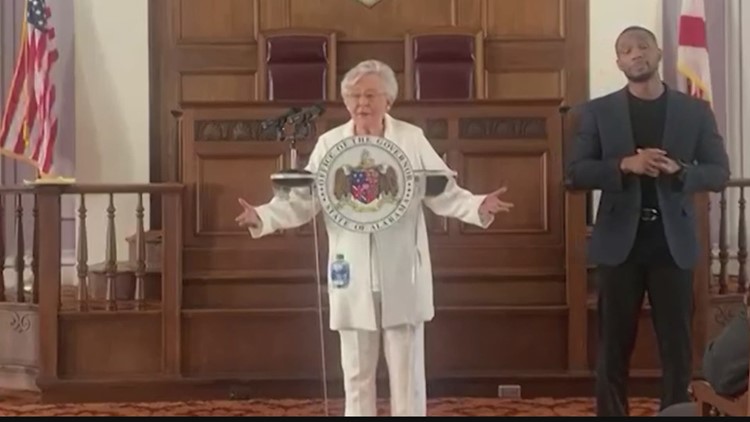MONTGOMERY, Ala. — A federal judge will hear arguments next month on whether to block enforcement of an Alabama law outlawing the use of gender-affirming medications to treat transgender people under age 19.
The May 5 hearing is scheduled just days before the law is set to take effect on May 8.
U.S. District Judge Liles Burke set the evidentiary hearing, scheduled to last up to two days, on a request for a temporary restraining order or preliminary injunction to stop Alabama officials from enforcing the law while a court challenge goes forward.
The Alabama law will make it a felony, punishable by up to 10 years in prison, for medical providers to give puberty blockers and hormones to transgender people under age 19 to help affirm their gender identity.
Four families with transgender children, two doctors and a member of the clergy filed a lawsuit challenging the law as an unconstitutional violation of equal protection and free speech rights and an intrusion into parental decisions.
_______________________________________________________________
Two families with transgender teens and two physicians sued the state of Alabama on Monday to overturn a law that makes it a crime for doctors to treat trans youth under 19 with puberty blockers or hormones to help affirm their gender identity.
The lawsuit was filed in federal court three days after Republican Gov. Kay Ivey signed the measure into law.
“By signing SB 184 Governor Ivey has told kind, loving, and loyal Alabama families that they cannot stay here without denying their children the basic medical care they need,” Dr. Morissa Ladinsky, one of the plaintiffs, said in a statement. “She has undermined the health and well-being of Alabama children and put doctors like me in the horrifying position of choosing between ignoring the medical needs of our patients or risking being sent to prison.”
The parents of a 13-year-old transgender girl in Jefferson County and a 17-year-old transgender boy in Shelby County are participating in the lawsuit. The plaintiffs are known as Roe and Doe in the court filing to protect the children's identities.
The Southern Poverty Law Center, the Human Rights Campaign, which is a national advocacy group for the LGBTQ community, and other groups are representing the plaintiffs. The Law Center announced the suit in a news release.
The Alabama law, which will go into effect May 8 unless blocked by the court, will make it a felony for a doctor to prescribe puberty blockers or hormones to aid in the gender transition of anyone under age 19. Violations will be punishable by up to 10 years in prison. It also prohibits gender transition surgeries, although doctors told lawmakers those are generally not done on minors.
Ivey signed the legislation on Friday, a day after it was approved by the Alabama Legislature.
“I believe very strongly that if the Good Lord made you a boy, you are a boy, and if he made you a girl, you are a girl,” said Ivey, who faces a May primary with conservative opponents trying to outflank her on her right. “We should especially protect our children from these radical, life-altering drugs and surgeries when they are at such a vulnerable stage in life. Instead, let us all focus on helping them to properly develop into the adults God intended them to be.”
Asked for a response to the legislation, Ivey spokeswoman Gina Maiola replied, "We are prepared to defend our values and this legislation.”
The lawsuit identifies the plaintiff as “Mary Roe,” a 13-year-old transgender girl who is accepted as a girl in both her church and her school. Mary began taking puberty blockers last year.
“For Mary to be forced to go through male puberty would be devastating; it would predictably result in her experiencing isolation, depression, anxiety, and distress," the lawsuit states. “Mary’s parents are also concerned that without access to the puberty-blocking medication she needs, Mary would resort to self-harm as a means of coping with her psychological distress or even attempt suicide.”
Similar measures have been pushed in other states, but the Alabama legislation is the first to lay out criminal penalties for doctors.
In Texas, Republican Gov. Greg Abbott has ordered the state’s child welfare agency to investigate as abuse reports of gender-confirming care for kids. And a law in Arkansas bans gender-affirming medications. That law has been blocked by a court, however.
Ivey also signed a separate measure that requires students to use bathrooms that align with their original birth certificate and prohibits instruction of gender and sexual identity in kindergarten through fifth grades.



